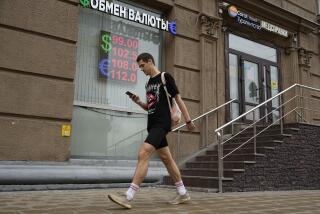CHAOS AND CURES : THE SOVIET ECONOMY
- Share via
Soviet consumers awoke to a costly nightmare this week, finding that, in their strict, government-controlled economy, an array of food and other goods suddenly had increased in price by more than 200%.
The Soviet government followed this economic move with a sharp devaluation of the ruble.
What’s behind these dramatic changes? Here’s a brief look: The Road to Ruine
The Soviet economy is disintegrating so rapidly its difficulties are multiplying faster than they can be diagnosed, let alone fixed. But underlying its latest woes are fundamental problems, on which Soviet and foreign economists alike agree. Some of these are:
An absence of competition. A key aspect of a centrally planned economy, this means that businesses have captive markets and no pressure to keep down costs or improve products. Government subsidies cover losses.
Little effort to increase efficiency, improve technology or innovate. This is a decades-old problem. Without entrepreneurial management, all key economic decisions were made by government bureaucrats or political leaders.
Misallocation of resources--raw materials, investment funds, labor--between economic sectors. Prices often do not cover costs.
Militarization of the economy. The defense share of the gross national product is estimated officially at 22%. There has been little input from the military-industrial complex in modernizing the economy.
Failure to produce more consumer goods. This has destroyed workers’ incentive. The Soviet ruble has become almost worthless, even inside the country.
Severe environmental problems.
Many industrial and agricultural regions on verge of ecological breakdown.
The economy’s complexity grew beyond central planners’ and government administrators’ ability to manage it. The amount of information and coordination needed grew faster than the economy itself.
Breakdown of the old system of central planning and government management. President Mikhail S. Gorbachev’s reforms have not led to the hoped-for replacement: a functioning market economy.
The Search for Remedies
President Mikhail S. Gorbachev’s first reforms have worsened many of the Soviet economy’s problems, and a sharp debate is under way among the Soviets about what to do now. The many new, sometimes contradictory measures now under discussion include:
Freeing prices gradually, allowing them to increase to encourage production; indexing pay and pensions to help consumers cope with inflation.
Privatizing small enterprises and offering greater autonomy to managers of larger, state-owned companies. Anti-monopoly legislation to create competition.
Dismissing tens of millions of workers from overstaffed enterprises. They would be retrained and offered government benefits.
Toughening fiscal measures--budget cuts, reduced subsidies, higher taxes, less credit.
Selling state-owned housing to residents.
Distributing agricultural land to farmers.
Modernizing key sectors, including retail and wholesale trade, energy, transportation and telecommunications.
Redirecting investment from consumer goods to heavy industries, notably energy and steel.
Passing a new Union Treaty, clarifying relations, including economic, between the central government and the republics.
Imposing more “political stabilization” and greater law and order, including a moratorium on strikes to give the government a free hand in policy-making.
Government Debt
In billions of rubles
1980: 85
1981: 94
1982: 109
1983: 119
1984: 128
1985: 142
1986: 162
1987: 184
1988: 312
1989: 398
1990: 550*
*estimated
Gross National Product
Annual growth in percent in comparable price/real terms
1980: 0.8
1981: 1.1
1982: 2.7
1983: 3.3
1984: 1.5
1985: 0.8
1986: 4.1
1987: 1.3
1988: 2.2
1989: 1.4
1990: -4.0*
*estimated
Inflation
Percent growth in quarter over correspondering quarter 1 year earlier
1987:
4.0
4.0
4.0
4.0
1988:
5.0
5.0
5.0
5.0
1989:
7.5
7.5
7.5
7.5
1990:
8.0
8.5
10.5
55.0
Sources: Times staff writer Michael Parks in Moscow; Plan Econ Report, Washington, D.C.; U.S. Central Intelligence Agency.
More to Read
Sign up for Essential California
The most important California stories and recommendations in your inbox every morning.
You may occasionally receive promotional content from the Los Angeles Times.













